CONTROVERSY ERUPTED on April 14 over the New York Times’s hiring of neoconservative climate-skeptic and anti-Arab polemicist Bret Stephens as the paper’s newest Op-Ed page columnist, hired away from the Wall Street Journal’s right-wing op-ed page. But just two days after it unveiled him, the paper’s op-ed page, with much less fanfare, announced that it had also hired a carbon copy of Stephens named Bari Weiss, also from the Wall Street Journal op-ed page, to “write and commission the kinds of quick-off-the-news pieces” that will “amplify the section’s already important voice in the national conversation.”
Exactly as she was doing a decade ago as a “pro-Israel” activist at Columbia and thereafter at various neocon media perches, her formula is as simple as it is predictable: She channels whatever prevailing right-wing grievance exists about colleges, Arabs or Israel critics (ideally, all of those) into a column that’s supposed to be “provocative” because it maligns minority activists or fringe positions that are rarely given platforms on the New York Times op-ed page.
She was first cheered for using this highly valuable journalistic real estate to attack organizers of the Chicago Dyke March for excluding flags that contained the Star of David on the grounds of similarity to the Israeli flag, followed by a crude guilt-by-association attack on the minority women who organized the Woman’s March based on their praise of various Muslims we’re all expected to hate, and then yesterday mocked campus criticsof “cultural appropriation,” taking time — in advance — to celebrate her own courage and martyrdom by including this line: “I will inevitably get called a racist for cheering cultural miscegenation.” (Weiss loves to declare her own brave martyrdom in advance of reactions to what she writes; “I’ll be accused of siding with the alt-right or tarred as Islamophobic,” she proclaimed in her column attacking the Women’s March organizers, concluding: “If that puts me beyond the pale of the progressive feminist movement in America right now, so be it”).
Weiss, standing alone, isn’t worth spending much time on: She’s just another thoroughly mainstream writer who thrives on cheap, easy, and superficial “controversy,” who sees herself as a brave intellectual dissident as she is continually celebrated by and gets promoted within the most mainstream media circles — all for spouting conventional and power-flattering critiques of largely powerless figures. But she is worth examining for what it says about the New York Times, its understanding of “diversity,” and the range of opinions it does, and does not, permit.
IN THE WAKE OF the controversy prompted by hiring Stephens, the Times justified its decision by appealing to precepts of intellectual diversity. The paper “has proclaimed a public commitment to reflecting a broader range of perspectives in its pages,” Public Editor Liz Spayd wrote, citing “the general principle of busting up the mostly liberal echo chamber around here.”
On CNN, the paper’s executive editor, Dean Baquet, chided critics of the Stephens hiring this way: “Didn’t we learn from this past election that our goal should be to understand different views?” He claimed that “the New York Times has a history of trying to bring in different voices,” asking rhetorically: “Don’t we want to surface all ideas?”
Few things are more laughable than watching the incomparably homogenized New York Times op-ed page justify itself with appeals to the virtues of diversity. If your goal were to wage war on media diversity in all of its forms, and to offer the narrowest range of views possible, it would be hard to top the roster of columnists the paper has assembled: Tom Friedman, David Brooks, Nick Kristof, Paul Krugman, Roger Cohen, Ross Douthat, Maureen Dowd, Frank Bruni, David Leonhardt, Charles Blow, Gail Collins, Bret Stephens, with Bari Weiss as a contributor and editor.
Beyond the obvious demographic homogeneity, literally every one of them fits squarely within the narrow, establishment, center-right to center-left range of opinion that prevails in elite opinion-making circles. Almost all of them, if not all, supported Hillary Clinton in the 2016 general election, and now have politics close to that neighborhood. None is associated with or supportive of the growing populist left or the populist right; they all wallow in the vague, safe, Washington-approved middle ground, members in good standing of the newly overt neoliberal-neoconservative alliance. As long as Stephens avoided talking about climate change and Douthat steered clear of abortion, most if not would all be capable of giving a speech that would be cheered at a so-called #Resistance rally, or at an AIPAC conference.
In writing about the controversy over the Stephens’s hiring, Huffington Post media reporter Michael Calderone summarized the glaring joke of the NYT Op-Ed page — of all places — claiming the mantle of viewpoint diversity:
But as far as embracing views far to the left or right, the Times’ full-time opinion writers have never represented a particularly wide range. The paper has never had a Pat Buchanan or Steve Bannon, a strident right-wing populist arguing against free trade, immigration and U.S. intervention abroad. Nor has it played host to a regular columnist from the anti-war left in the vein of Michael Moore, or an anti-capitalist like Naomi Klein.And several of its left-leaning voices on the op-ed page are often aligned with conservatives on foreign policy. Stephens, like [Bill] Kristol before him, backed the 2003 invasion of Iraq. But so did Tom Friedman. And like Stephens and Kristol, both Friedman and Nick Kristof supported Trump’s decision last week to strike Syria in response to a chemical attack.
As my colleague Zaid Jilani put it when the Stephens’s hiring was announced: “Stephens’s voice is hardly new to the media landscape — it echoes the powerful and attacks the powerless, specifically marginalized groups like Arabs and Muslims who have little representation in U.S. media. … The Times editorial page currently does not have a female minority columnist and, despite frequently writing about conflicts in the Middle East, employs no regular Arab American or Muslim American writers.”
That’s not to say there are zero differences among NYT columnists. Douthat expresses occasional social issue conservatism; Brooks and Krugman have passive-aggressively argued on elements of conservative dogma and economic policy; and Stephens’s climate views are certainly an outlier. But on the most contentious issues that divide the country, the range of opinion they offer is as narrow and stultifying as their demographic diversity is.
The old joke used to be that, for mainstream media, diversity of views spanned the range from the centrists at The New Republic to the conservatives at National Review. For the contemporary NYT op-ed page, diversity spans the small gap from establishment centrist Democrats to establishment centrist Republicans, with the large groups of people outside of those factions essentially excluded.
BARI WEISS IS a caricature of all of the op-ed page’s longest-standing, worst attributes. Her relatively short career as a writer and activist has been overwhelmingly devoted to one issue: a defense of the Israeli government and a corresponding smear campaign against its critics. Her targets have tended overwhelmingly to be Muslim and/or Arab, often in the context of campus politics. She has already used her NYT space to endorse the disgusting and false Haim Saban-created smear campaign against the first Muslim elected to the U.S. Congress, writing: “Recall that only a few months ago, Keith Ellison, a man with a long history of defending and working with anti-Semites, was almost made leader of the Democratic National Committee.”
Weiss’s admirers, such as Niall Ferguson, the right-wing Harvard professor and husband of Netanyahu-fan Ayaan Hirsi Ali (whom Weiss admires), have hailed her columns as an “amazing and welcome outbreak of intellectual diversity at the New York Times.” But while Weiss brings many things to the New York Times, viewpoint diversity is plainly not among them.
There’s not a single view she holds about Israel or campus controversies that couldn’t be, and hasn’t been, repeatedly expressed by Friedman, Stephens, and Brooks, if not also Cohen and Douthat. Hiring her didn’t add an iota of viewpoint diversity; it just replicated tendentious views about Israel and its largely marginalized critics that have been repeated for years on those same NYT pages to the purposeful exclusion of actually dissenting voices.
That devotion to Israel is the North Star of Weiss’s worldview and journalism was best demonstrated by Weiss’s own description of her career. At a 2012 Conference of the American Zionist Movement, Weiss gave a speechabout what she called the “connection between advocacy journalism and Zionism.”
She explained that she “got involved in journalism through activism” — specifically, activism against Arab and Muslim professors at Columbia whom she accused of bullying Jewish and Israeli students. That was as part of an incredibly ugly campaign, launched by the film “Columbia Unbecoming” to depict those Arab professors — members of one of America’s most marginalized groups — as oppressors of Jewish students.
One of the Arab professors targeted by that campaign, Joseph Massad, described it as “the latest salvo in a campaign of intimidation of Jewish and non-Jewish professors who criticize Israel.” The New York Civil Liberties Union condemned the campaign and that film — which Weiss credits as having catalyzed her interest in journalism — as a witch hunt designed to punish Israel critics: “The attack on Professor Massad and other in the [Middle East Studies] Department is really about their scholarship and political expression.”
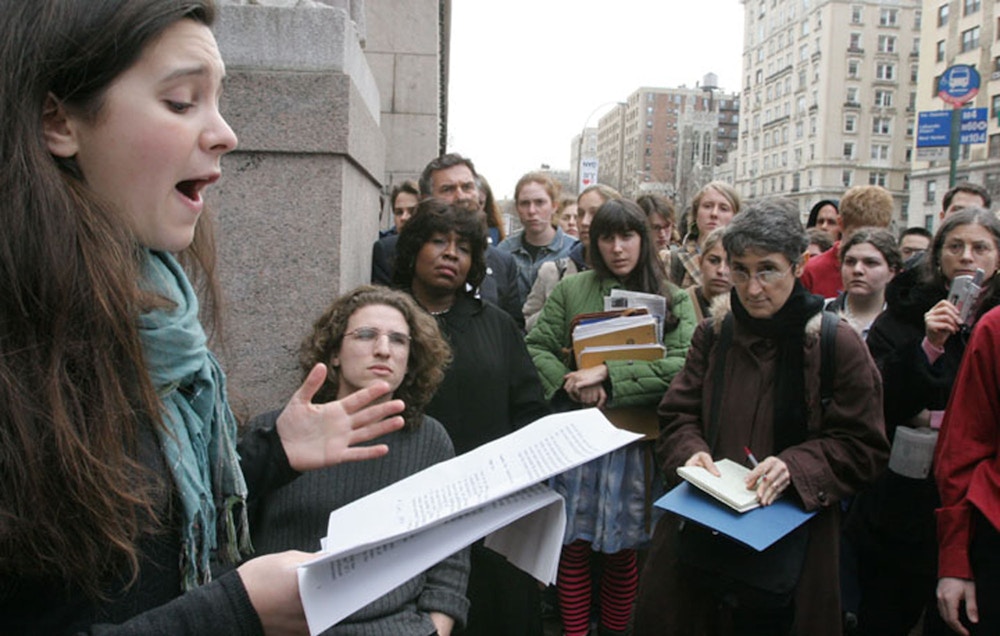
Bari Weiss, left, then a sophmore at Columbia Univerity, speaks at a press conference outside the university’s gates on March 31, 2005, to denounce a university report stating that Columbia University’s Middle Eastern studies professors did not engage in large-scale intimidation of pro-Israel students.
Photo:Tina Fineberg/AP
Weiss’s activism against these professors was preceded by a one-year stint in Israel. After she crusaded against these Middle East studies professors at Columbia, penning columns denouncing them, she was quickly hired by the standard organs for neoconservative opinion: the New York Sun, Tablet, then the Wall Street Journal op-ed page. She gushed that the Wall Street Journal op-ed age was perfect for her politics — it “can often be an island of sanity for those of us who care about Zionism and Israel” — and explained that she went to Tablet “because I wanted the chance to focus on Jewish issues.”
Weiss’s attacks on Muslim and Arab professors weren’t limited to the Columbia campaigns. She also participated in the campaign to destroy the reputation of Nadia Abu El-Haj, an American-born rising star in the academic world who had received a Fulbright scholarship and a fellowship at Harvard. Abu El-Haj, a doctorate of anthropology, has a Palestinian-Muslim father and an American Episcopalian mother.
In 2002, she published a book anthropologically examining Jewish claims to a biblical entitlement of Israel, and it won numerous scholarly awards, along with critical praise from her academic colleagues at the University of Chicago, where she was teaching. As a New York Times article described, the book documented that as “Israeli archaeologists searched for an ancient Jewish presence to help build the case for a Jewish state … They sometimes used bulldozers, destroying remains of other cultures, including those of Arabs.” Abu El-Haj’s book questioned their anthropological conclusions designed to bolster Israel’s current political posture.
Though the petition ended up being ultimately discredited, and Abu El-Haj was eventually given tenure at Barnard, the ensuing controversy was toxic, tarnishing the reputation of this young professor. “She is a scholar of the highest quality and integrity who is being persecuted because she has the courage to focus an analytical lens on subjects that others wish to shield from scrutiny,” Michael Dietler, an anthropology professor at the University of Chicago, told the Times, “and because she happens to be of Palestinian origin.”
A senior professor of Religion and Jewish Studies at Barnard, Alan Segal, ultimately led the on-campus campaign against Abu El-Haj. “He was used to being consulted on anything at Barnard involving ancient Israel,” said the New Yorker. In the campaign, Segal breached academic protocol by publicly attacking and maligning her scholarship, telling the New York Times: “There is every reason in the world to want her to have tenure, and only one reason against it — her work.”
One of the media leaders stoking the flames against this accomplished young American-Palestinian academic was Bari Weiss, living in Jerusalem at the time. With no training or expertise whatsoever in anthropology, a deficiency she made up for with her ample passion for publicly smearing Israel critics, Weiss attacked Abu El-Haj in the Israeli daily Haaretz, arguing that “this is not just another round between the Zionists and the anti-Zionists,” but instead, “is about the nature of truth, and the possibility of, well, facts themselves.”
Depicting Abu El-Haj as a disciple of another Weiss target, the late Columbia Middle Eastern studies Professor Edward Said, Weiss claimed that Abu El-Haj, in her book, “is forced to abandon the methodology of science altogether.” Of the award-winning and highly praised work, Weiss said: “She has written a book condemning the notion of facts themselves.” Weiss’s sudden outburst of concern for academic and anthropological rigor and the scientific method seems to find expression only as a tool for smearing people who happen to be critics of the Israeli occupation and/or scholars of Arab descent.
It’s truly amazing: Weiss now postures as some sort of champion of free thought on college campuses. Yet her whole career was literally built on ugly campaigns to attack, stigmatize, and punish Arab professors who criticize Israel. And that’s because, as she herself has said, she regards her journalism as merely a form of “Zionist activism.”
SO THAT’S WEISS’S overwhelming preoccupation: defending Israel, primarily by vilifying its critics. Why the New York Times op-ed page — in the midst of feigning a devotion to diversity — decided that this is what it needed more of is mystifying indeed, given that her views on her central issue are already shared by many, if not the large majority, of her colleagues on that page.
Just review her own list of views that she believes converted her into a brave and “politically homeless” dissident on college campuses, “in which being an outspoken Zionist made you fascist, supporting the war in Iraq made you an imperialist, and believing that some cultures are indeed more enlightened than others a hegemon.” Those beliefs are not the hallmark of a dissident but rather the prevailing views of the New York Times op-ed page where she now works.
Indeed, at the time of hiring, Weiss heaped praise on Stephens. And that makes sense: They are virtually indistinguishable, particularly when it comes to Weiss’s obsessive focus on Israel and its critics. Though it got little attention amid the controversy over his climate change denialism, Stephens has expressed blatant anti-Arab bigotry in the past: “The Arab world’s problems are a problem of the Arab mind, and the name for that problem is anti-Semitism,” he once wrote, adding that this “Arab mind” has produced few achievements: “Today there is no great university in the Arab world, no serious indigenous scientific base, a stunted literary culture.”
Weiss’s most celebrated NYT column thus far — her attack on Women’s March organizer Linda Sarsour for praising Muslim extremists and expressing anti-Israel ideas — was just a rehash of a similar column she wrote earlier this year at Tablet that asked in the headline, referring to Sarsour: “Do Jews have to make common cause with people who want to kill them?”
Others have dissected the glaring fallacies of that particular Women’s March column, as many have done with Weiss’s celebration of cultural appropriation yesterday, so we can leave those to the side. But let’s apply one of Weiss’s favorite smear tactics that she used against Sarsour — finding someone who her target has praised, and then finding their worst comments to attach to her target — to Weiss herself.
Judging by the praise she dishes out on her Twitter feed, Weiss’s favorite people are all part of that insular, highly homogenized clique of war-loving, “pro-Israel” neoconservative American writers: John Podhoretz, Jamie Kirchick, Bill Kristol, Eli Lake, and Stephens. And they all adore her. But, to use her words in maligning the Women’s March organizers, she sure does “have some chilling ideas and associations.”
One of the people Weiss most admires and most frequently praises, Podhoretz, is literally an advocate of genocide. He wrote a 2006 New York Post column wondering whether “the tactical mistake we made in Iraq was that we didn’t kill enough Sunnis in the early going to intimidate them and make them so afraid of us they would go along with anything?” He added: “Wasn’t the survival of Sunni men between the ages of 15 and 35 the reason there was an insurgency and the basic cause of the sectarian violence now?”
Of Bari Weiss’s friend and beloved writer, Podhoretz, the foreign policy analyst Gregory Djerejian expressed shocked that he “would muse so innocuously about the merits of mass butchery — basically the wholesale slaughter of a broad demographic of an ethnic group writ large — a policy prescription that is quasi-genocidal in nature.”
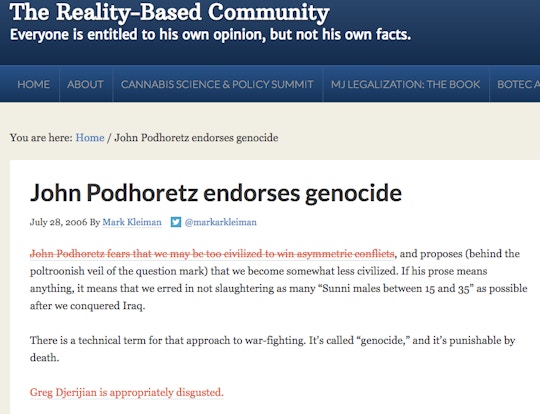
Another one of Weiss’s favorite writers, Jamie Kirchick, got his start in journalism working as an assistant for and protégé of long-time New Republic publisher Marty Peretz, whose own writers have exposed his countless expressions of overt anti-Arab and anti-Muslim bigotry. Kirchick himself has his own history of ugly anti-Muslim animus, such as his defense ofanti-Muslim stereotypes on the grounds of accuracy, and his invocation of Stephens’s “disease of the Arab mind” phrasing.
A tip for Muslims angry about Muslim stereotypes: stop acting like Muslim stereotypes.
Stephens himself, one of her mentors, has a history of ugly defamations against Arabs and Africans. And then there’s Bill Kristol — himself once a NYT columnist — whose record of advocating the most extreme evil and blatant deceit is too well-known to merit discussion.
So on top of her own history of crusading against Arabs, Muslims, and other assorted critics of Israel, Weiss’s own “associations” and admired figures have a long history of overt hatred against such groups and have espoused some of the most repugnant ideas to gain traction in U.S. discourse since the War on Terror began. Using her own standards of judging people by the worst views of those whom they have praised, shouldn’t this put Weiss beyond the pale of what’s tolerated in decent company?
News outlets, even the New York Times, are free to hire only those writers which espouse particular orthodoxies or ideological views — whether on Israel or any other hotly contested topic. But what they shouldn’t do is insult everyone’s intelligence by prancing around as advocates of diversity. Hiring Bari Weiss as a new op-ed writer isn’t something you do if you are committed to fostering viewpoint diversity at your paper; it’s what you do if you want to further smother it.
Top photo: People walk past the New York Times building in New York City on July 27, 2017.

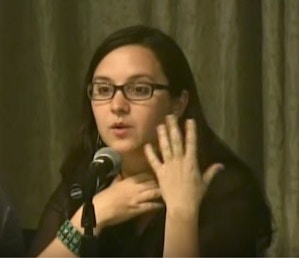
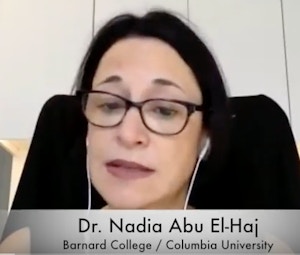
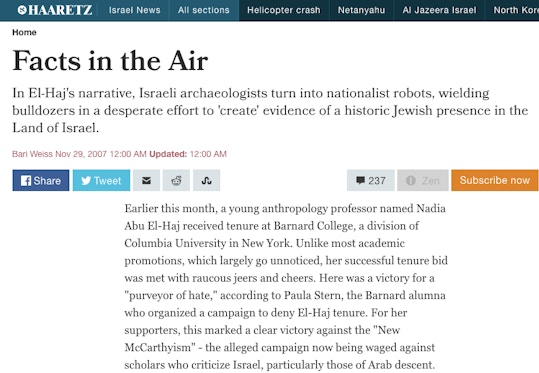














Geen opmerkingen:
Een reactie posten